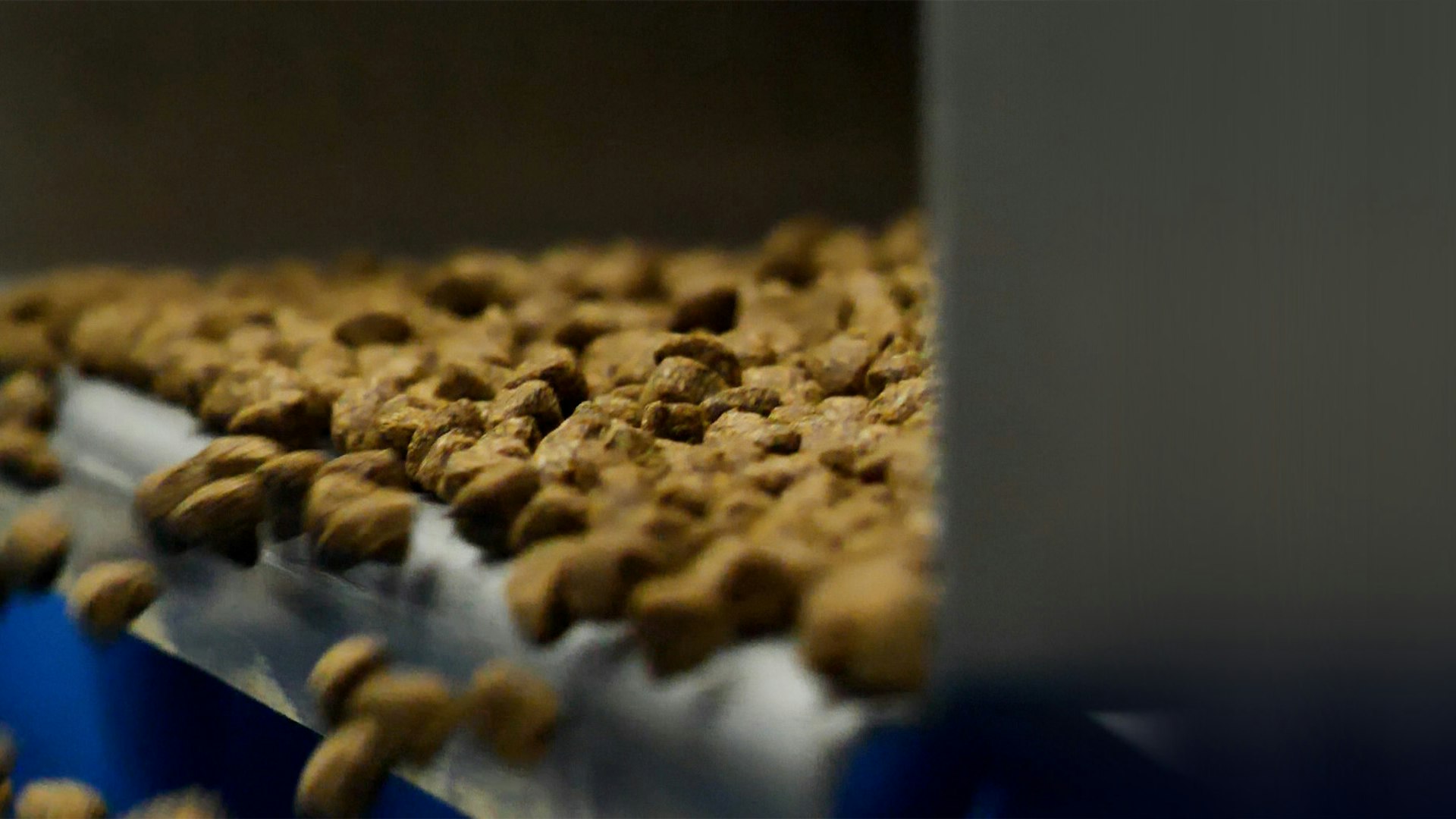Plant, Pet and Feed

Marel’s acquisition of Wenger in 2022 established our fourth key business segment: Plant, Pet and Feed. Wenger is the global leader in extrusion systems, widely known for its pioneering contributions in pet food, plant-based protein and aqua feed.
The acquisition enhances margins and earnings, with immediate opportunities for growth and value creation by leveraging Marel’s global reach and digital platforms in Wenger’s sizeable and highgrowth markets.
Wenger shares Marel’s passion for innovation and commitment to best-in-class products. Together, we are poised to transform our industries by connecting our strengths and creating valuable synergies between technologies and skills.
Wenger is committed to groundbreaking innovation and has been from the very beginning. Like Marel, Wenger has a target to invest 6% of its annual revenues in innovation.
The Wenger business model is proven, with a 90-year track record of success. Backed by an experienced team, the company has a diversified and loyal customer base ranging from blue-chip pet food processors to startup companies in plant-based proteins.
Over 60% of Wenger’s revenues derive from pet food, where the company has a global leading position within its focus market segments. Wenger has a strong foothold in the North American market, and over 40% of its revenues come from services. This has resulted in healthy profitability with an EBIT margin of 14% (pro forma), strong cash flow and solid return on invested capital.
Marel's presence in the plant-based, pet food and aqua feed value chains

Steady growth of existing businesses
From 2017 to 2021, Wenger’s revenues grew organically by an average annual rate of approximately 5%. The third quarter of 2022 was the first quarter where the newly acquired Wenger business was consolidated into Marel’s reporting segment Plant, Pet and Feed. The segment also includes revenues that were historically reported under Marel’s ‘Other’ segment. Plant, Pet and Feed’s revenues in 2022 were EUR 144 million, or 12% (pro forma) of total revenues, and a 17.7% increase compared to 2021.
Attractive markets with strong growth potential
The global pet food market is estimated to be worth around EUR 110 billion and the aqua feed market over EUR 50 billion, both growing at 4-6% annually. The plant-based protein market is currently valued at around EUR 10 billion and is expected to grow 15-20% annually. The total addressable market for Marel and Wenger in all three areas is estimated to be worth around EUR 2 billion, with expected annual growth of 4-6% in the long term. This aligns with Marel’s long-term expectations for market growth.
Capital expenditures focus on capacity and aftermarket
Marel sees great opportunities and is committed to investing in the combined business to accelerate growth, adding structure and discipline to Wenger operations. Key capital investment priorities include expanding manufacturing capacity to shorten lead times and meet existing high demand, as well as capitalizing on opportunities in aftermarket solutions in Wenger’s core markets.


Did you know?
Leading innovations since 1935
Wenger has been a leading provider of industrial machinery and process systems for the food and feed processing industries since 1935. Founded as a family-owned business, Wenger has grown into a multinational company with nearly 500 employees worldwide and brands including Extru-Tech, Maverick and Source Technology.
Headquartered in Sabetha, Kansas, Wenger manufactures the industry’s most comprehensive line of commercial extrusion systems, known globally as the standard in food and feed processing. Products include single- and twin-screw extruders, horizontal and counterflow dryers, controls and other ancillary hardware. Thanks to Wenger’s pioneering example, machines that allow customized solutions, stringent food safety and sustainable operations are now the industry standard.
Wenger Technical Center
Prior to being acquired by Marel, Wenger completed a EUR 20 million project to expand and modernize the Wenger Technical Center. This 3,800 m2 research and development hub has been important to the extrusion industry since 1954. It houses full-scale extruders, dryers and ancillary components to provide a realworld production environment.
Customers, academics and other industry partners use the Wenger Technical Center to accelerate product development, evaluate prototypes and test new products and processes to expand their scope of market-facing solutions and services. The center complements Marel’s vast network of demo centers. Marel and Wenger will collaborate in these facilities to advance our pipeline and showcase new products and processes, particularly in plant-based proteins.
Synergistic partnership
Marel and Wenger are powerful partners due to our compatible strategic and cultural fit, as well as our complementary product portfolio and global presence. This unique positioning allows us to meet the growing demand for high-quality, affordable and sustainable processing of food and feed.
Complementary product portfolio
Wenger’s respected position gives Marel an advantage in combining existing technology both upstream and downstream of Wenger’s solutions. In turn, Marel’s global reach and digital capabilities enable Wenger to offer more complete end-to-end processing solutions. Wenger brings industry-leading extrusion, drying and process control technologies, which pair well with Marel’s weighing, sorting, inspection, forming and thermal treatment solutions.
Together, we will accelerate the advancement of ideas into transformative systems that meet the needs of food producers in the pet food, aqua feed and plant-based protein sectors.
Comprehensive pet food processing line
Having a complete line of equipment from one provider is a tremendous benefit to customers, resulting in a more efficient and seamless production system. Already, Marel and Wenger experts are working with our industry partners to explore the efficiencies of combined process and aftermarket solutions. We are also evaluating new and enhanced food product formats that are only possible because of the close collaboration between our areas of expertise.

Tapping into Marel’s global reach
Wenger will utilize Marel’s global reach to support a proactive aftermarket approach for improving customer service and pursuing cross-platform sales opportunities. With a long history of thinking and working globally, Wenger is well equipped to provide tailored solutions to meet customers’ unique needs worldwide. The collaboration with Marel further strengthens Wenger’s ability to localize and personalize. Marel’s extensive sales and service network, with offices in more than 30 countries, brings the Plant, Pet and Feed platform closer to customers, expanding Wenger’s ability to be the partner of choice.
Cross-sales between the four key business segments
For many customers of Marel’s Poultry, Meat and Fish segments, expansion into the pet food industry is a logical step from their human food lines as they look to optimize the value-add of their raw material. By leveraging Marel and Wenger’s loyal and well-diversified customer base, we aim to explore opportunities for cross-selling between these four key business segments.
Unlocking digital potential
Digitalization unlocks new potential for aftermarket services and to strengthen connections with customers as pandemic restrictions have lifted.
Marel’s digital platform supports a more proactive approach to providing customers with value-added services such as parts and maintenance, creating new opportunities for the Plant, Pet and Feed segment. This makes it easier for customers to connect with Wenger virtually and use digital tools to see their order history, order parts and make service requests.
Giving customers greater process visibility with Innova
With Marel’s software solutions, Wenger can now provide the advanced digital services customers have been asking for. By integrating Marel’s digital platform with Wenger’s Automated Process Management (APM) system, we are transforming the customer experience, providing much greater insight, control and traceability. Customers have visibility from the time materials are received at the factory to the moment they exit to distribution. These digital tools give customers the performance data they need to make more efficient use of labor and raw materials.

A diversified customer base
Wenger has a broad and loyal customer base that includes the world’s largest pet food processors as well as startup companies in plant-based proteins and sustainable packaging. In pet food processing, five companies dominate the industry, making up 75% of all sales. Each of the top five companies is a Wenger customer.
Multinationals choose Wenger because its solutions are synonymous with extrusion processing systems and the company’s reputation for quality and service is unsurpassed.
Startups choose Wenger because it provides the innovation, support and expertise their small operation might not have in-house. Investing in Wenger equipment makes them more attractive to potential buyers because it gives investors confidence in the scalability of the product.
Wenger’s solutions also fit niche markets, which enables the premiumization trend in pet food, supports the rapidly growing plant-based protein market and meets the needs of highly specialized industries like aqua feed.
Sustainability
Wenger and Marel share a commitment to sustainability, and Marel’s expertise in reducing processing waste and improving yields creates economic value for Wenger. By adopting sustainable practices, we aim to make a meaningful impact. In the Plant, Pet and Feed segment, we focus on enhancing the energy efficiency of our equipment, with a particular emphasis on recovering and reusing processing waste. Marel has a strong track record in waste reduction, and together we will continue to innovate in this area.
Environmental advantages of extrusion
Compared to many other batch food production processes, extrusion is inherently more efficient and economical, and requires less water and energy. Wenger has taken steps to increase energy efficiency and minimize waste during startup and shutdown. Wenger’s PetFlex and AquaFlex processes are derivatives of thermal twin extrusion technology, which reduce environmental impact, increase production speed and lower energy costs. Wenger products also lead the extrusion industry in minimizing water usage.
Reducing processing waste
Marel and Wenger have been operating in parallel for many years. Marel has led advancements in waste efficiency in poultry, meat and fish processing, while Wenger has forged pathways for pet food processing as the original sustainable, closed-loop protein reclamation industry. Together we can make better use of raw materials and by-products to improve processing yields and create higher-value products.

Did you know?
The importance of extrusion
Wenger founders, Joe and Lou Wenger, commercialized the first extrusion-cooking system in the late 1950s. Though significant advancements have been made over the decades, the extrusion systems that Wenger offers still retain many traits of that origin.
Extrusion cooking involves hydrating ingredients, mixing them into a dough and then continuously processing them through thermal and mechanical input into a value-added foodstuff for people, pets or livestock. Extrusion is vital for dry pet food production and is also important for processing wet foods, especially those with higher meat inclusion.
New protein formats emerging from early foundations
The food industry’s growing interest in plant-based proteins is not new territory for Wenger. The company was a forerunner in texturizing vegetable proteins in the 1970s, when they were mainly used as fresh meat extenders. Extrusion processing formed the basis of texturizing vegetable proteins, and Wenger has continued to innovate to develop the plant-based protein formats of the future.
In 2022, Wenger received the largest order in its history. The order is from a customer that has been with Wenger since its earliest foray into textured vegetable protein (TVP) and includes multiple TX-168 extrusion systems. These systems are the largestcapacity TVP extruders on the market and are only available from Wenger. The new units will enable the customer to expand production of textured protein ingredients used in plant-based burgers, cutlets, nuggets and other plant-based protein options.
Market trends and growth drivers
Inflationary pressure
Commodity and energy prices, especially in European countries, are the greatest challenges facing Wenger customers, as they have a significant impact on operating costs. Ingredient shortages also affect pet food and aqua feed, as the war in Ukraine has disrupted grain trade, making production lower than forecasted in many regions.
Pet food
Pet food sales are not recession-proof, but they continue to prove their resilience. Pet food is a more than EUR 110 billion industry that experienced 25% growth from 2016 to 2020. Dry food, produced using extrusion technology, accounts for 73% of total pet food volume, with dog and cat food comprising 95% of all pet food sales.
Despite pandemic and economic pressures, global pet food sales are growing. Treats, a Wenger specialty, lead as the fastestgrowing segment of pet food. Dry food sales are on a rapid growth trajectory in Latin America and Asia, and cat food in Asia is the fastest-growing segment with a 15% compound annual growth rate (CAGR) expected from 2021 to 2026. Indeed, Asia and Oceania, and Latin America are the fastest-growing markets overall, with growth tied to the rapidly developing middle class in those regions.
Wenger will continue to focus on selling to dominant players in growth regions and creating value for customers in more mature markets. We will emphasize connecting to larger processors and leaders planning to expand in Asia and Oceania, and Latin America.
The highest-value markets for pet food are North America and Europe due to their high level of disposable income. Nearly half of all households in the United States own a dog, and 27% own a cat. In Europe, 24% own dogs, and 25% own cats.
Humanization of pets
Extrusion processing is vital to meeting consumer demand for solutions that support pet health and wellness. Trends in pet food increasingly reflect those in the human food industry, with a growing demand for healthier, more diverse options made from fresh, high-quality ingredients. Plant-based proteins are a growing trend in pet food because they satisfy consumers’ desire for healthier and more sustainable ingredients and processes. Millennials represent the largest purchasing segment in pet food, and this younger generation is more willing to spend more on their pets’ health and wellbeing.
These trends are spawning a steady flow of startups producing highly specialized pet products, and this market segment looks to Wenger for innovative new products in the same way that large multinationals look to Wenger developments in efficiency, sustainability and aftermarket partnership.
Plant-based protein
Leaders in plant-based proteins are currently recalibrating to determine the most marketable formats and business models. Protein is the ‘center of the plate’ and the most expensive part of the grocery bill, and in tough economic times, consumers will look for protein sources that offer the most value for money.
Conventional meat, while also hampered by inflation, is perceived as being higher in value than plant-based alternatives as consumers know the traditional products well. However, there is great optimism over new plant-based formats entering this sector, and Wenger is uniquely positioned to play an integral part in advancing the industry with best-in-class technology and know-how. The plant-based proteins sector offers great opportunity, but it is subject to market volatility as the industry finds the most effective ways to bring these products to the center of the plate.
Many plant-based protein products are produced through extrusion. While some formats of plant-based proteins have not performed well, high moisture meat analogs (HMMA), textured vegetable proteins and meat extenders have proven their longevity and continue to grow. Within the Wenger Extrusion Group, Source Technology’s PowerHeater and the Wenger HMMA process can simulate whole-meat counterparts with similar characteristics for moisture, protein, flavor and fat content.
Aqua feed
Price has been a challenge for aqua feed, as the pandemic and war in Ukraine have disrupted the supply of raw materials. However, there may be good news on the horizon as commodity prices are going down and several salmon producers are reporting that feed ingredients have likely reached their peak price.
The sector has gone through tremendous change over the past few decades, and as the market matures, much of the industry is shifting to extruded feed. Some markets are very commoditized, such as traditional pond-based shrimp and catfish.
In this hyper-competitive market sector, Wenger’s multi-brand strategy has proven resilient. For instance, Wenger brands Extru-Tech and Maverick offer aqua feed systems that deliver particularly strong performance for their prices, making them the most competitive brands in this area among the Wenger Extrusion Group brands. Meanwhile, the Wenger brand is especially competitive in high-value markets such as salmon and the emerging trend of recirculating aquaculture systems (RAS) technology, which is a significant step toward the environmental and sustainable production of fish species for human consumption. By offering a range of extrusion systems under different brands, Wenger can effectively target different market segments and provide customers with the optimal solutions for their needs.
Wenger is bringing new processing technology to aqua feed with the AquaFlex XT High Capacity Twin Screw Extruder. The AquaFlex has a higher level of processing capabilities and makes use of a wider range of raw materials than traditional single-screw extruders. In this time of price volatility and ingredient scarcity, the AquaFlex gives Wenger customers a unique advantage.
Outlook and strategic priorities
As we look to 2023, we anticipate challenges in new equipment sales as customers respond to market dynamics and global economic challenges. Despite this, we continue to see a trend toward the premiumization of pet food products. While it is unknown how consumers will react to worsening economic conditions, we expect that there will be slightly less spending on premium pet food, including treats, while traditional and lower-cost formulas will remain stable.
Benefiting from Marel’s support and expertise, Wenger will be able to increase focus on aftermarket solutions and cost efficiency in ways that were not previously possible. Marel enhances Wenger’s ability to fill gaps in knowledge and assistance. When a machine operator in Thailand needs support, we can offer excellent customer service by connecting them to a local Thai-speaking Marel partner. This is customer service excellence.
